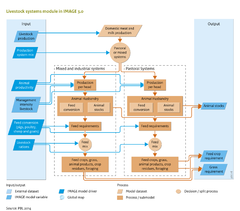Livestock systems: Difference between revisions
Jump to navigation
Jump to search
No edit summary |
No edit summary |
||
| Line 3: | Line 3: | ||
|ComponentCode=LS | |ComponentCode=LS | ||
|MainComponent=Agriculture and land use | |MainComponent=Agriculture and land use | ||
|InputVar=Production characteristics livestock; Production system mix; Feed conversion; Livestock ration; Livestock production; Management intensity livestock; | |InputVar=Production characteristics livestock; Production system mix; Feed conversion; Livestock ration; Livestock production; Management intensity livestock; | ||
|OutputVar=Animal stock; Feed crop requirements; | |OutputVar=Animal stock; Feed crop requirements; Grass requirement; | ||
|FrameworkElementType=model component | |FrameworkElementType=model component | ||
|Description=Model intro | |Description=Model intro | ||
|LeadText=What are the impacts on land-use, greenhouse gases and other emissions to air, land and surface water of increasing livestock production? And how may use of marginal lands for grazing increase the risk of degradation and loss of productivity, inducing more forest clearing. | |LeadText=What are the impacts on land-use, greenhouse gases and other emissions to air, land and surface water of increasing livestock production? And how may use of marginal lands for grazing increase the risk of degradation and loss of productivity, inducing more forest clearing. | ||
}} | }} | ||
Revision as of 09:30, 24 September 2013
Parts of Livestock systems
| Component is implemented in: |
| Components: |
| Related IMAGE components |
| Projects/Applications |
|
| Models/Databases |
| Key publications |
| References |
Key policy issues
- What are the impacts of increasing livestock production on land use, greenhouse gases and other emissions to air and surface water?
- How does the use of marginal lands for grazing increase the risk of degradation and loss of productivity, inducing more forest clearing?
Introduction
"model component" is not in the list (driver component, pressure component, interaction component, state component, impact component, response component) of allowed values for the "FrameworkElementType" property.
